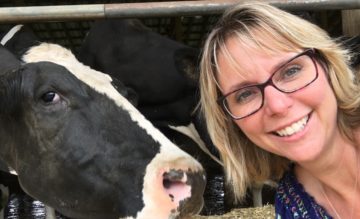3 reasons why antibiotics are given to farm animals
Medical doctors, doctors of veterinary medicine and others share concern about antibiotic resistance, and actions are being taken globally to address the concern.
The United Nations General Assembly passed a declaration last fall intended to slow the spread of bacteria resistant to antibiotics.
Earlier this year in the United States, the animal health community, farmers and veterinarians changed how antibiotics are administered in agriculture.
With the attention today on antibiotics and the serious issue of antibiotic resistance, what role does animal agriculture – that is, animals raised for food – play?
And just why are animals given antibiotics?
While antibiotic resistance is a technical and complex matter, reasons antibiotics are a necessary and vital part of modern agriculture are fairly simple and straightforward, and guided by a belief that antibiotics must always be used responsibly.
Changes in the U.S. ensure that antibiotics important to human medicine are used only for disease treatment, prevention and control in animals, not growth promotion, and treatment often requires a veterinary feed directive or a prescription from a veterinarian beforehand.
With responsible use as the base, three main reasons farmers give antibiotics to livestock and poultry are:
1. Antibiotics prevent animal suffering.
Animals sometimes get sick from bacterial infections, leaving them in pain and suffering. When a veterinarian can responsibly treat sickness to stop suffering, that’s the ethical action to take. In fact, we take an oath pledging to do so.
The Veterinarian’s Oath includes protection of animal health and welfare, and the prevention and relief of animal suffering, in addition to the promotion of public health.
The American Veterinary Medical Association says antibiotics are one of the most important tools veterinarians use to protect both human and animal health. Doctors of veterinary medicine, like medical doctors, work to ensure antibiotics are used responsibly to reduce the risk of resistance.
2. Antibiotics given to farm animals keep them healthy, which makes healthy food.
Responsible use of antibiotics in animals leads to an overall decrease in bacteria. Antibiotics help make food safe by keeping animals healthy and reducing bacteria entering the food supply.
We are confident in the safety of food from animals treated with antibiotics because the Food and Drug Administration has a rigorous approval process for animal medicine, just as it does for human medicine. The FDA not only examines a drug’s effectiveness, but also confirms that meat, milk and eggs from animals treated with an antibiotic are safe for us to consume.
There are multiple safeguards in place to ensure safety. Before an antibiotic is approved for use in animals, extensive studies determine how long antibiotics take to leave an animal’s system (known as withdrawal periods).
By law, animals given an antibiotic cannot be processed until the withdrawal period ends. The Department of Agriculture and meatpackers routinely test meat before it leaves the processing plant to ensure there are no unsafe residues.
3. Antibiotics are part of sustainable production.
Responsible use of antibiotics helps keep animals healthy and minimizes the impact on the environment.
Left untreated, sick animals grow more slowly, requiring more food and water. Then more grain must be grown for feed, which requires more fertilizer, water and acres of land. So, sick animals have a larger environmental impact while healthy animals use fewer natural resources.
Practices that allow us to treat sick animals, resulting in the use of fewer natural resources, are good for the environment and good for everybody.
In closing …
Antibiotics are one of many tools veterinarians and farmers use to promote animal health. Their responsible use helps all of us.
A World Health Organization official said, when asked about antibiotics used in animals that produce food, “If we lose that ability, we perhaps begin to lose the ability to have adequate food supplies in the world.”
For me, that’s a sobering thought that provides important context for the current antibiotic discussion.
I welcome your thoughts and questions. Please feel free to send me an email at AskDrDorman@pahc.com or call me at 844-288-3623. You can also browse our Resource Library to learn more about this important topic.

